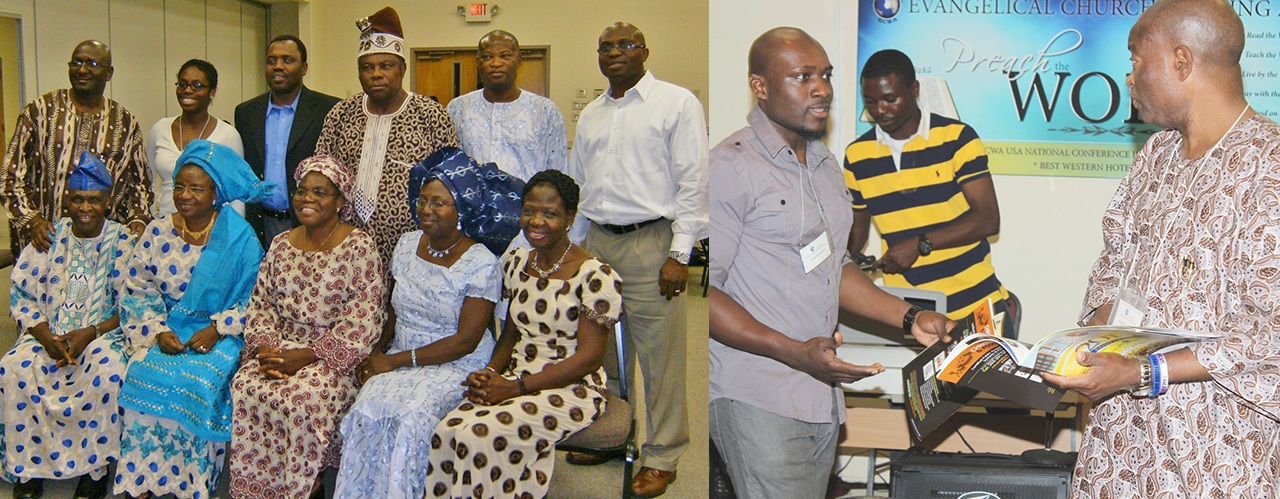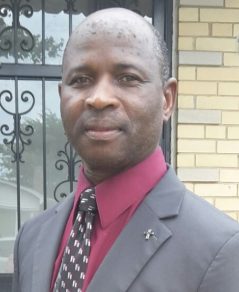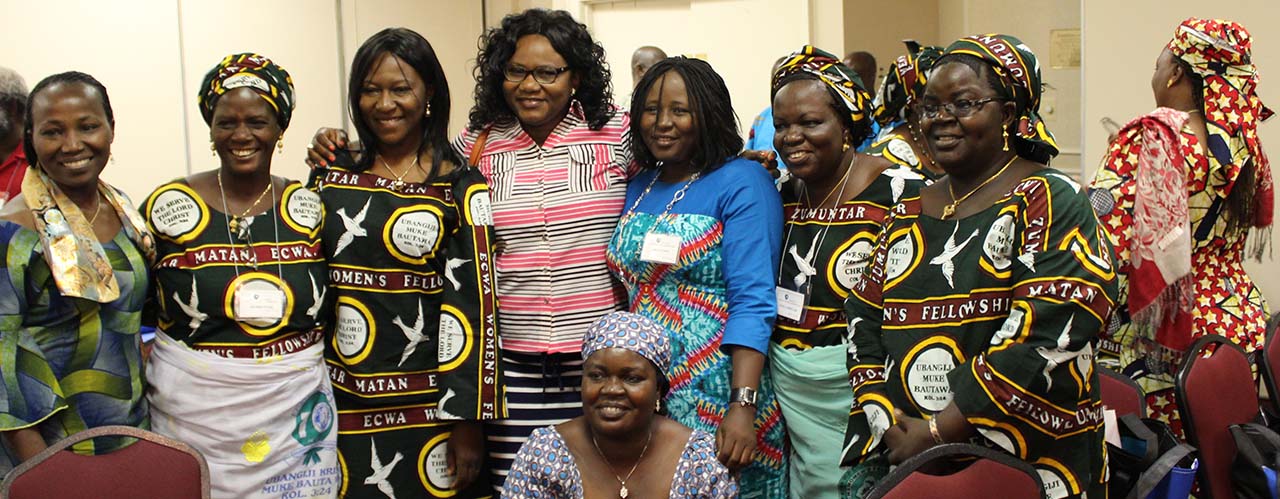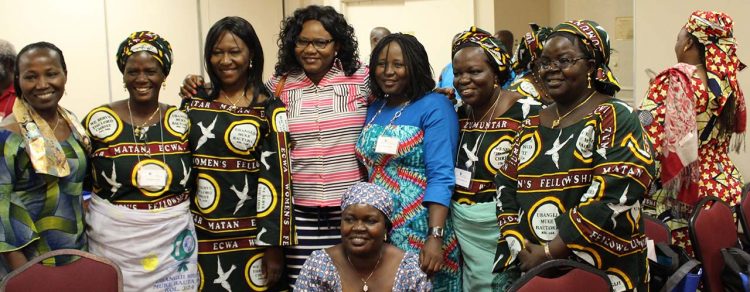TUESDAY 1ST Happy New Year to you! Praise God for His sustaining grace and mercies that kept us thus far. Ask the Lord for greater multiplication of His word in us and with us.
- Pray for God’s anointing on us afresh to serve Him faithfully this 2019 and pray for the Gospel to accelerate and yield hundred-fold and that through us the knowledge of the glory of God will spread wide among men this year and beyond.
WEDNESDAY 2ND Praise God for all those who volunteered their gifts, skills, education, talents, time and resources as contribution to Kingdom services with EMS in 2018. Pray that God will grant grace and peace to each and every one who has made himself available to be used for the Gospel.
THURSDAY 3RD Praise God for the new converts in Bantanima, Senegal. A woman along with her household accepted Jesus. Praise God for the conversion of the landlord in Gungul, Gambia. We praise God for convicting him to join the church that started in his house.
FRIDAY 4TH Praise God for using the school that was newly opened in Old Yundum, Gambia as a means to bring a parent to the saving knowledge of the Lord and Savior Jesus Christ.
SATURDAY 5TH Praise God for a successful training of leaders who came from three churches in our Zambian mission station. It was an exciting time for the churches coming together as they felt very encouraged in sharing burdens and ministry ideas.
WEEK TWO – FOCUS IS ON EMS HOME MISSION FIELDS
But He said to them, “I must preach the kingdom of God to the other cities also, for I was sent for this purpose. Luke 4:43
SUNDAY 6TH EMS MANAGEMENT Pray for fresh grace, blessings, protection and daily strength upon the EMS Management Team as they work daily and travel to advocate Christ’s cause and provide leadership within Nigeria and abroad for the purpose of God’s mission around the world.
NOTE – WE ARE FASTING TOMORROW
FIRST (1ST) MONDAY OF EVERY MONTH IS TO BE OBSERVED NATIONALLY AND INTERNATIONALLY AS EMS PRAYER AND FASTING DAY. THEREFORE, ALL EMS ARMS, MISSIONARIES, OFFICE STAFF, PRAYER PARTNERS AND SUPPORTERS SHOULD PLEASE ENDEAVOR TO JOIN THE EMS INTERNATIONAL HEAD OFFICE IN PRAYERS. WE JOIN FAITH AND TRUST GOD IN ONE ACCORD WITH BRETHREN AROUND THE WORLD FOR A STEADY AND FRUITFUL GROWTH OF THE WORK OF MISSIONS, PEACE AND THE SALVATION OF NATIONS, FOR REVIVAL AND SPIRITUAL GROWTH OF THE CHURCH. OUR COOPERATE PRAYER TIME AT THE HEAD OFFICE IS 8-9AM, 12-1PM, AND 3-4 PM RESPECTIVELY. YOU CAN JOIN US IN PRAYERS WHEREVER YOU MAY BE AT THOSE TIMES OR MAKE OUT TIME OF YOUR OWN CONVENIENCE AS YOU ARE LED BY GOD. PLEASE, JUST BE SURE TO PRAY ALONG AS YOU FAST.
MONDAY 7TH EMS BOARD MEMBERS Ask the Lord to please keep EMS Board Members humble and always relying upon him to give them the perfect wisdom and direction that they need to strategize and advice EMS leadership on how to move the ministry forward.
TUESDAY 8TH EMS SUPPORTERS Pray for EMS Supporters and Partners that God will strengthen them and pour fresh zeal and increased passion for God’s Kingdom on them. Ask the Lord to grant open doors for many who pledge to support EMS to fulfill their pledges.
WEDNESDAY 9TH EMS STAFF Praise God for all EMS staff; they have been doing well at their various desks. Ask God to bless them spiritually, physically and financially.
THURSDAY 10TH ECWA EXECUTIVES Pray that the ECWA mandate to fulfill Matt. 24:14 will be fruitful this year. Ask the Lord for daily grace, guidance and wisdom on ECWA Executives for more of God wisdom and unity of purpose for mobilizing and impacting the body of Christ and its leadership to fulfill the mission of God worldwide.
FRIDAY 11TH ECWA MINISTERS/STAKEHOLDERS Pray that the Lord will restore His church to her Kingdom responsibility as priests and kings. Ask that this restoration will begin with all ECWA ministers and stakeholders at many levels.
SATURDAY 12TH CENTRAL REGION – GARKI DCC Praise God for the commitments of the many individuals, groups, families and churches supporters God has blessed EMS with in this region. Ask the Lord to renew and replenish their grace as they serve God’s purpose with their gifts, talents, skills and resources In 2019 and beyond. Pray that God will give us more of these people to advance His work this year.
WEEK THREE – FOCUS IS ON EMS HOME MISSION FIELDS
But just as we have been approved by God to be entrusted with the gospel, so we speak, not as pleasing men, but God who examines our hearts. 1 Thessalonians 2:4
SUNDAY 13TH NORTH WEST REGION – KADUNA Pray for missionaries who are working and laboring in difficult terrains in this region. Ask the lord to shield, guide and defend them and their families from every evil in 2019.
MONDAY 14th MID CENTRAL REGION- KAGORO Ask for open doors for the penetration of the gospel into difficult terrains in this region. Pray that God will direct our ministry plan for 2019 to break new grounds to preach, make disciples and plant more churches in this region.
TUESDAY 15TH SOUTH NORTH EAST REGION- JALINGO Ask the Lord to sustain the young family of Pas. & Mrs. John Isa and that of Pas. & Mrs. Cyrus Ishaku who got married last year in December.
- Let keep praying for Christian communities in this region that are still displaced as a result of attacks from terrorists. Pray especially for a firm foundation for the believers who can’t gather for worshipin their usual churches. Also pray that the pastors of all the churches that are currently closed due to these attacks will stay focused and be guided in seeing areas the Lord will have them serve Him during this challenging period.
WEDNESDAY 16TH FAR NORTH – KATSINA DCC Pray for the fruitfulness of our outreach teams to unreached communities of this region. Pray for the harvest of souls as missionaries launch out to preach the gospel. Pray that we will experience the Pentecost again in 2019.
THURSDAY 17TH NORTH CENTRAL REGION – JOS Pray for spiritual awakening in the body of Christ in this region this year. Pray for spiritual enablement, exemplary leadership, right influence and a deep sense of commitment to Scripture and missions among God’s servants in the North Central Region, so that through them the purpose of God will be achieved.
FRIDAY 18th EMS MUSLIM OUTREACH UNIT Pray for the Muslims around the world that God will encounter them. Pray that Christians will be well-informed and suitably equipped to minister to them globally.
- Pray for the successes of all the training scheduled for this year in all ECWA Muslim Background Believer (MBB) centers. Ask the Lord to console the bereaved in the wake of atrocities committed in the name of Islam in Nigeria and elsewhere.
SATURDAY 19th FAR NORTH- KASTINA
- We thank God for New Life for All who went on an outreach to the mission station and recorded eight new converts in Gidan Maidoki; ask the Lord to grant sustaining grace on these converts as they are discipled by the resident missionaries.
- Pray also for a financial opening for the building project at Gidan Soda and Dandume in Tsiga
DCC WEEK FOUR – FOCUS ON CROSS-BORDERS MISSION FIELDS
But He said to them, “I must preach the kingdom of God to the other cities also, for I was sent for this purpose.” Luke 4:43
SUNDAY 20TH Praise God for the successful evangelistic activities that were embarked on across the foreign mission fields in 2018. Pray for a fruitful ministry in the 18 countries that EMS is reaching out to. May God grant more wisdom and grace on all cross borders missionaries as they put up relevant strategies to reach out to their communities this year.
MONDAY 21ST GAMBIA
- Ask the Lord to raise workers who can work in French-speaking Senegal and in new Gambian mission fields.
- Pray for the Gambian Seminary that started with 3 students; pray for God’s wisdom and understanding of His word. Also pray for the primary school at Old Yundum that has predominantly Muslim pupils. May they be ministered to even as they receive sound teaching.
TUESDAY 22ND ECWA REPUBLIC OF TOGO
- Pray for God to provide support for the completion of the building of a mission church in Kaboli that is ongoing.
- Pray for God to provide EMS of ECWA Togo with a vehicle for the purpose of coordination of the mission work.
- Pray for God’s provision to acquire a land for ECWA Togo Headquarters. Two hectares of land for the ECWA HEADQUARTERS OF TOGO is estimated to cost about Five Million Naira only (₦5,000,000.00) in Sokode.
WEDNESDAY 23RD ECWA REPUBLIC OF TOGO
- Praise God for the successful starting of ECWA Theological School Togo which kickstarted in September 2018. Pray for God’s wisdom on the school leadership as they put up strategies to enhance the school’s growth.
- Pray for the provision of at least 5 motorcycles for the missionaries that are working in the interiors to run the work easily.
THURSDAY 24TH ECWA ZAMBIA
- Pray for the three congregations in Zambia- Kitwe, Luanshiya and Mufilira – for God’s direction as they meet to map out schedules for 2019.
- Also pray for these churches to embrace evangelism and giving for the gospel.
- Pray for the Zambian team of our missionaries as they focus on the fields that God will give thempatience and commitment.
FRIDAY 25TH ECWA CAMEROON Pray for some of the EMS missionaries in Cameroon that are in dire need of motorcycles for the progress of the work.
SATURDAY 26TH ECWA MALI
- Let’s be in prayers for Sister Edith Aboubakar who encountered the Lord through the prison ministry of the Amahs (our missionary in Mali). She has left Mali to return home as a free woman. Ask that the Lord will increase upon her grace to be steadfast and stay committed to serving God in truth and in spirit.
- Let’s also uphold our sister Hauwa who gave her life to Christ through the house fellowship ministry Mrs. Amah started. Pray for good understanding of the Word as she is descipled; ask the Lord to keep her focused and steadfast as she struggles with the issues of her husband leaving to marry another wife.
- Continue to pray for God’s provision for the Amahs to care for some of sister Hauwa’s needs.
- The foundation-laying process of the permanent site of ECWA Mali has stopped for lack of cash;please pray for God’s provision for the progress of the work.
WEEK FIVE – FOCUS ON OTHER EMS MISSION UNITS
Preach the word; be ready in season and out of season; reprove, rebuke, exhort with great patience and instruction. 2 Timothy 4:2
SUNDAY 27TH EMS TRAINING UNIT Thank God for the impact of all our trainings and programs in 2018. Pray that this year our trainings and programs will receive wider acceptance with greater multiplication and that believers and leaders will truly be equipped to fulfill the Great Commission. Pray for our Staff Retreat.
MONDAY 28th EMS HOUSE OF HOPE-GIDAN BEGE
- Praise God for the provision of funds to buy 13 wheelchairs to our targeted handicapped women and children.
- Praise God for the miraculous provision for kids’ Christmas clothes and grains for the year 2019.
- Praise God for the provision of admissions for some of our kids into tertiary institutions; pray forprovisions for their upkeep in school and for God’s divine protection as they resume.
- Pray for EMS HOUSE OF HOPE’s Consultant for safety; he traveled to the US to see his family.
TUESDAY 29TH EMS RELIEF UNITAsk the Lord for help from above as EMS empowers widows, orphans and the less-privileged through this unit. Pray that the Lord will open doors of grace and supply to EMS as we seek new avenues to raise money for this effort.
WEDNESDAY 30TH MISSIONARY KIDS Pray for the children of missionaries and pastors, that the good Father will shield them from mischief of the devil and strengthen them in their call to follow the Lord In this year 2019 and beyond.
THURSDAY 31TH EMS NATIONAL MISSION CONFRENCE EMS is trusting God to bring together all its missionaries from all its mission fields across Nigeria to converge in a conference at the headquarters in Jos in April. Pray for financial support for the conference.
THANK YOU FOR PRAYING WITH US THROUGH THE FIRST MONTH OF THE YEAR 2019. MAY THE LORD RENEW YOUR STRENGTH AND ALSO INCREASE UPON YOU GRACE AS YOU CONTINUE WITH US IN THIS PARTNERSHIP. SHALOM!!!











 by Rev. Sunday Bwanhot is EMS/SIM Missionary. He serves as Team leader of SIM Culture Connexions; Pastors of ECWA Chicago.
by Rev. Sunday Bwanhot is EMS/SIM Missionary. He serves as Team leader of SIM Culture Connexions; Pastors of ECWA Chicago.

 Dr. Mrs. Eunice Abogunrin is a visiting lecturer at lgbaja. Online Professor of Theology at Liberty University. Secretary of ECWA Women Fellowship USA.
Dr. Mrs. Eunice Abogunrin is a visiting lecturer at lgbaja. Online Professor of Theology at Liberty University. Secretary of ECWA Women Fellowship USA.

 Dr. (Mrs.) Omobukola Olaoye is a Home Healthcare Quality & Management Consultant; Administrator for A Premium Healthcare Solution, Financial Director of ECWA USA DCC.
Dr. (Mrs.) Omobukola Olaoye is a Home Healthcare Quality & Management Consultant; Administrator for A Premium Healthcare Solution, Financial Director of ECWA USA DCC.
 Rev Philologus O. Irukera is a trained and ordained minister. He is an assistant minister at ECWA Church in Maryland.
Rev Philologus O. Irukera is a trained and ordained minister. He is an assistant minister at ECWA Church in Maryland.





